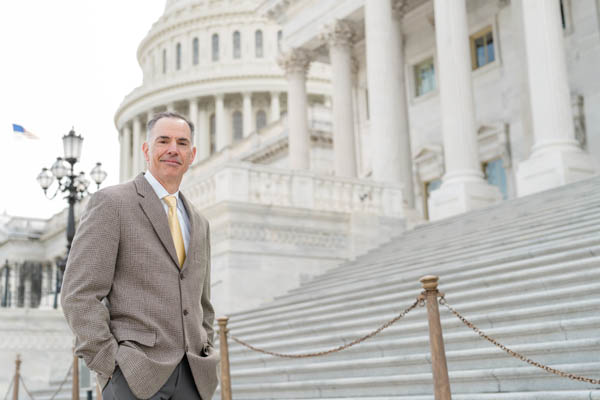Richard Ricciardi, Ph.D., CRNP, FAAN, will draw on his four decades of nursing experience to lead Sigma Theta Tau International (STTI), one of the largest international nursing organizations.
Dr. Ricciardi, a GW Nursing faculty member, served 30 years on active duty in the U.S. Army as a pediatric and family nurse practitioner, clinical scientist and senior leader. His positions included chief of nursing research at Walter Reed Army Medical Center and director of research at the Defense Centers of Excellence for Psychological Health and Traumatic Brain Injury.
When Dr. Ricciardi assumes the Sigma presidency in November, he plans to address one of the biggest issues in health care: provider burnout.
“Nurses are very privileged to be invited into the lives of patients, but there are consequences. One can become somewhat burdened, and burden can lead to depersonalization, burnout and lack of joy in what you do,” he said.
While burnout is common among health care providers, its effect on nurses is particularly concerning since nurses care for patients at their most vulnerable moments. “When you’re not fully engaged in your practice, medical errors can occur, less than optimal health care is delivered and the work-life balance of nurses is thrown out of kilter — all of that is unhealthy,” Dr. Ricciardi said. Rekindling job satisfaction is not only crucial to improving professional satisfaction but also key to improving patient care, he said.
At GW Nursing, Dr. Ricciardi serves as director of strategic partnerships for the Center for Health Policy and Media Engagement. In that role, he is developing a seminar series that will focus on advocacy and health policy initiatives and prepare nurses to participate in health debates in both the media and the political arena.
Having a voice in the media is particularly important for nurses since nurses rarely serve as expert sources, despite 18 years leading a U.S. Gallup poll of trustworthy professions. Nurses were identified as sources in 4 percent of health news stories and were never cited in health news stories on policy, according to the 1998 “Woodhull Study on Nursing and the Media: Health Care's Invisible Partner: Final Report.” A 2018 follow-up study found that representation of nurses in the media has not improved.
“Being engaged in advocacy and health policy means being engaged in the media,” said Dr. Ricciardi. “Much of what is learned about policy efforts occurs through media sources.”
As patient advocates and research experts, nurses are uniquely positioned to provide input on a wide range of health topics and can become more effective leaders through education and experience. Dr. Ricciardi promotes the importance of leadership development through his work with STTI, and to his students in the Doctor of Nursing Practice program, where he teaches courses in health policy and analysis.


